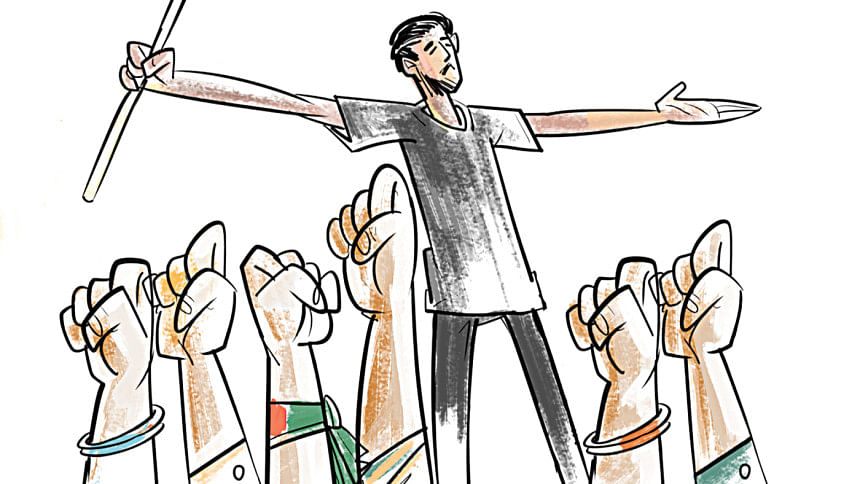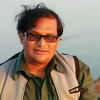The hands that stretched to freedom

Abu Sayed is no longer just a name.
The English department student of Begum Rokeya University, Rangpur (BRUR) was brutally shot dead by police on this very day a year ago.
Martyred on his own campus for protesting a discriminatory quota system, he has become a symbol of a generation's conscience in its fight against authoritarianism.
The video of his killing -- Sayed with arms outstretched, a single stick in hand -- showed how metal pellets struck him one after another.
The footage, which spread like wildfire, did more than galvanise the quota reform movement; it turned it into a nationwide student-led uprising that brought down Sheikh Hasina's authoritarian regime.
A year on, the country today observes the July Shaheed Dibosh (July Martyr's Day).
His fellow students and protesters remember him as an idealist who gave his life fighting injustice.
Sabina Yasmin, a BRUR English student, said, "He used to tell us, 'If I disappear or die, you must carry the movement on. We are not against anyone, we are against discrimination … If my blood is needed, I am willing to shed it.'"
Born into an impoverished family in Babanpur Jafarpur village of Rangpur's Pirganj upazila, Sayed -- the youngest of nine siblings -- aspired to become an educator. His father Mokbul Hossain, 76, is a farmer, and his mother Monowara Begum, 65, a homemaker.
Always known to be studious, Sayed had his life changed after he enrolled in BRUR as a 12th batch (2019–20) student.
Last year, he joined the anti-discrimination student movement, already gaining traction nationwide, calling for reform of the quota system, which reserved 30 percent of government jobs for the children and grandchildren of freedom fighters.
For him, the fight was about ensuring equal rights for all. Soon enough, he became one of the key coordinators of the movement at BRUR.
On July 16 last year, students were holding a peaceful sit-in, led by Abu Sayed, at the university gate to protest the indiscriminate attack on Dhaka University students by Chhatra League just a day earlier.
Suddenly, police charged batons and fired tear gas and bullets. It was then that a fearless Sayed stood his ground, taking pellet after pellet until he crumbled.
Fellow protesters carried him, unconscious, to Rangpur Medical College Hospital (RMCH) on a rickshaw. Upon arrival, doctors said he had died on the way.
Shahriar Shohag, a BRUR journalism student, told The Daily Star, "We were chanting 'We want justice, we want rights' during the sit-in. Suddenly, we heard gunshots. I saw Sayed bhai lying on the road… It's been a year and I still can't sleep. Every time I close my eyes, I see that very image.
"He wasn't affiliated with any political party. He was a dreamer who wanted justice in education and equality in society. His death is like a mirror -- we must look at ourselves through it… [To us] Shaheed Abu Sayed is the 'Tank Man' of Bangladesh. He is our idol."
The "Tank Man" is a nickname given to an unidentified individual who stood defiantly in front of a column of Type-59 tanks in Beijing's Tiananmen Square on June 5, 1989.
Sabina said Sayed was a born leader.
"Under his leadership, the movement gained momentum at our university from June 6. He became the coordinator and we were well-organised because of him."
Golam Rahman Shaon, a history and archaeology student, said, "All day, every day, he [Sayed] remained at the protest site. He handled everything -- setting up the stage and banners, writing slogans, arranging food, and managing communications.
"To cover the expenses, Sayed bhai initiated small donation drives among students. BCL [Chhatra League] activists tried to obstruct us, we received many threats. But because of his leadership, we kept going."
Dr Tuhin Wadud, a BRUR Bangla teacher, said police did not stop even after Sayed's death.
"Due to police intimidation, RMCH doctors were initially unwilling to issue a death certificate. But after more student protests, they were compelled to do so," he said, adding that police refused to allow Sayed's body back to campus for final respects.
"We weren't even allowed to use a government ambulance to return his body to his home in Rangpur. Police stopped us multiple times along the way. We reached around 3:00am."
Sayed's elder brother Ramzan Ali -- also the plaintiff in the murder case -- said, "After his death, we were under immense pressure. If the movement hadn't succeeded, we might not have been able to live in peace.
"We now just want a fair probe into the case. No perpetrator should walk free, and no innocent person should suffer."
Speaking to The Daily Star, Abdar Hossain, a neighbour of Sayed in Rangpur, said, "He was a simple, humble, and dedicated young man. Whenever he came home, he checked in on local students and encouraged them. His absence is deeply felt in our village. He is irreplaceable."
A whole year later, Monowara still cannot speak about her son's death. "They took away my brilliant son…"
Sayed's father Mokbul said the entire family's hopes rested on him. "Our other children didn't study much. Some are involved in small businesses, some work as day labourers."
Mokbul was speaking while standing by his son's grave yesterday.
In the meantime, the family has received Tk 10 lakh in government and private compensation. Sayed's sister Sumi Akter was offered a job at BRUR, while the local administration is building a mosque, library complex, and road -- all named after Shaheed Abu Sayed.
However, Mokbul said, "My son's sacrifice will only hold meaning if good governance is ensured in this country."

 For all latest news, follow The Daily Star's Google News channel.
For all latest news, follow The Daily Star's Google News channel. 






Comments